
Forget cold-blooded killers and territorial beasts—some animals are just in it for the love. These surprising sweethearts break the wild stereotype with behaviors that are more cuddly than clawing. Whether it’s a dolphin that remembers your face, a cow that gives you kisses, or a raven who brings gifts, these creatures blur the line between animal instinct and genuine friendship.
From scientific studies to real-world stories, we’ve rounded up 12 animals that don’t just tolerate humans—they seem to actively seek us out. Get ready to rethink your social circle, because these furry, feathered, and flippered friends just might want to be your new bestie.
1. Dolphins

Dolphins aren’t just smart—they’re deeply social, emotionally expressive, and famously curious about humans. In the wild, dolphins have been known to swim alongside boats for miles, mimicking movements and even making eye contact. Some have even been seen bringing “gifts” like coral or seaweed to divers they recognize. In places like the Bahamas and Australia, individual dolphins have formed ongoing friendships with swimmers and scientists, greeting them by name-specific whistles and staying by their side for years. One dolphin named Dusty in Ireland famously followed and swam with locals daily for over a decade, often nudging them gently like an affectionate puppy.
What’s behind their friendliness? According to Vallarta Adventures, dolphins have one of the most advanced limbic systems in the animal kingdom—the part of the brain responsible for emotion. They form tight-knit pods, mourn their dead, help injured companions, and have even been known to rescue humans from sharks. Their brains are not only large relative to body size but also wired for connection. Marine biologists believe their kindness toward humans isn’t just curiosity—it may be genuine affection. If any animal seems like it’s trying to start a conversation with you, it’s probably a dolphin.
2. Capybaras

If the animal kingdom had a chill ambassador, it would be the capybara. Native to South America, these giant guinea pig lookalikes are famously calm, deeply social, and remarkably unbothered by, well, everything. Capybaras live in large herds, often sharing their space with birds, monkeys, turtles, and even caimans without a fuss. In zoos and sanctuaries, they’ve become known as “friend magnets,” happily cuddling with other animals—and people—like it’s just another Tuesday. They’re the type of creature that will crawl into your lap like a cat, close their eyes, and let out a happy sigh.
Their friendliness isn’t just random cuteness. Capybaras are wired for connection. According to PMC, they rely on grooming, huddling, and group naps to maintain social bonds, which makes them naturally open to new pals, including humans. Studies have found that capybaras can recognize individual faces and form preferences for certain people based on how they’re treated. In Japan, they’ve become viral spa stars, soaking in hot springs with towel-wrapped heads and letting humans scrub their backs. If you’re dreaming of a low-drama bestie who’s always down for a snuggle and a soak, the capybara might just be your soulmate.
3. Ravens
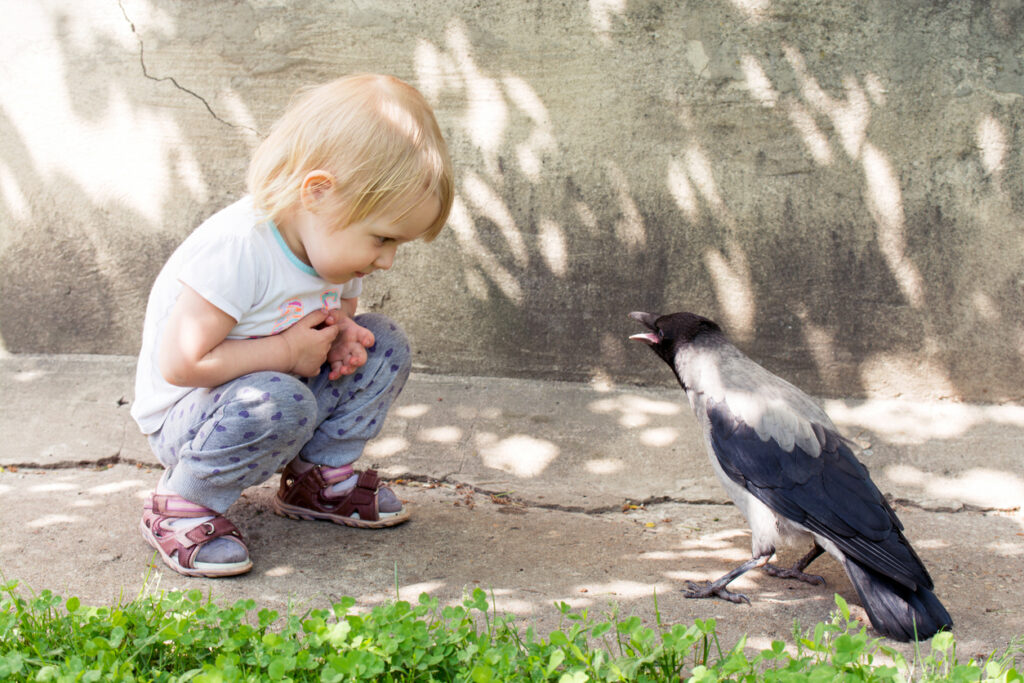
Ravens get a bad rap for their eerie aesthetic, but behind the black feathers is one of the most emotionally intelligent animals on the planet. These brainy birds can recognize individual human faces, hold grudges, and even form friendships with people who treat them well. In the wild, ravens have been known to bring shiny gifts—like coins, buttons, and bits of wire—to people they trust. One young girl in Seattle famously received more than 100 gifts from a pair of neighborhood ravens, including a paper clip still attached to a scrap of paper, and even a tiny metal heart.
Their loyalty is backed by serious science. According to researchers at the University of Vienna, ravens not only remember the kindness of others—they also demonstrate emotional intelligence on par with great apes. They console their peers, plan for future events, and share food with trusted companions. Scientific American reports that ravens can even make economic decisions based on long-term social strategy—something very few animals are capable of. So if a raven ever stares you down from a rooftop, don’t assume it’s an omen. It might just be sizing you up as a future friend.
4. Elephants
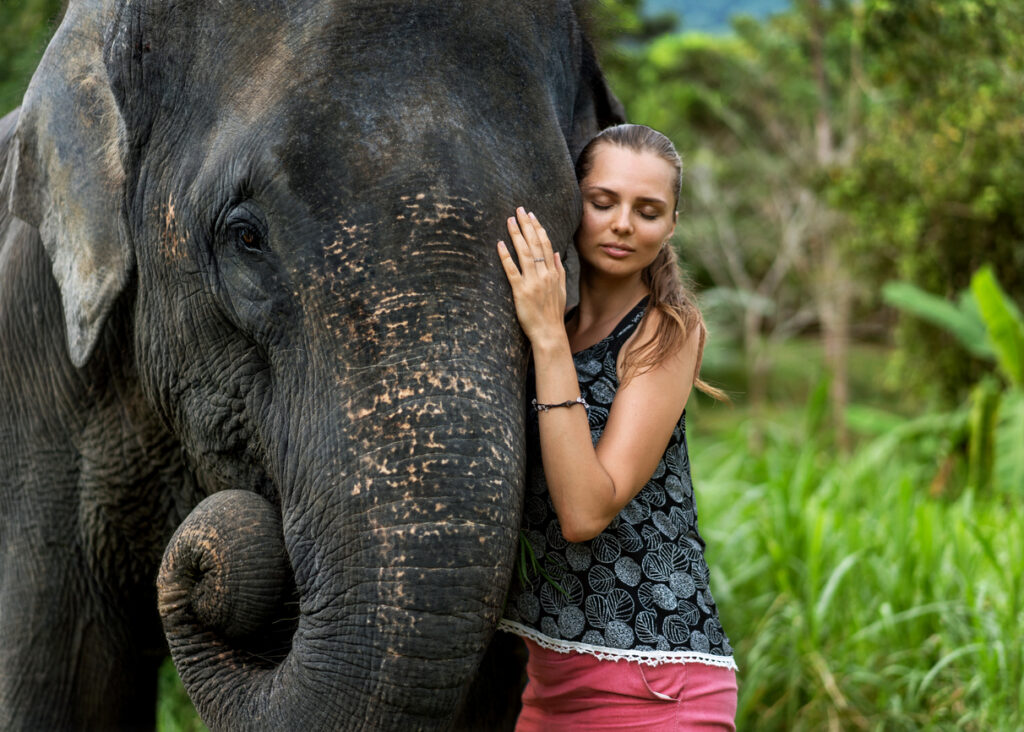
Elephants aren’t just the giants of the animal kingdom—they’re emotional powerhouses with a reputation for deep, lasting bonds. These gentle beings are known to comfort crying companions, revisit the graves of deceased herd members, and show empathy across species lines. There are real stories of elephants traveling miles to reunite with former human caretakers after years apart, sometimes using their trunks to gently caress a familiar face or even shed tears. They don’t just remember—they feel.
According to research published in National Geographic, elephants are one of the few species that console others in distress, using physical touch and vocalizations to offer support. Their brains have a massive hippocampus—the region associated with emotion and memory, which scientists believe explains their extraordinary ability to recognize humans even decades later. They’ve even been observed helping injured antelopes and defending humans from threats. In sanctuaries and conservation zones, elephants have been seen initiating affectionate contact with humans, wrapping their trunks gently around arms or resting their heads on a shoulder. Befriend an elephant, and you may gain a fiercely loyal companion who never forgets your kindness.
5. Dogs

Dogs aren’t just man’s best friend—they’re wired for it. Domesticated over 15,000 years ago, dogs are one of the only species scientifically proven to bond with humans in a way that mimics parent-child attachment. They read our facial expressions, respond to our tone, and even mirror our emotions. From curling up beside us when we’re sad to jumping for joy when we return home, their loyalty goes far beyond obedience—it’s emotional fluency. And for many, that connection is more grounding than human relationships.
A study from Emory University found that dogs’ brains light up in response to the scent of their owner, specifically the caudate nucleus, the part linked to pleasure and reward. That means just smelling you makes them happy. They’ve also been shown to release oxytocin (the “love hormone”) when they make eye contact with their humans, a phenomenon previously thought to exist only between parents and infants. Therapy dogs are now widely used to support veterans, children with autism, and patients in trauma recovery. If there’s any creature biologically built to love you back, it’s already curled up at your feet.
6. Quokkas
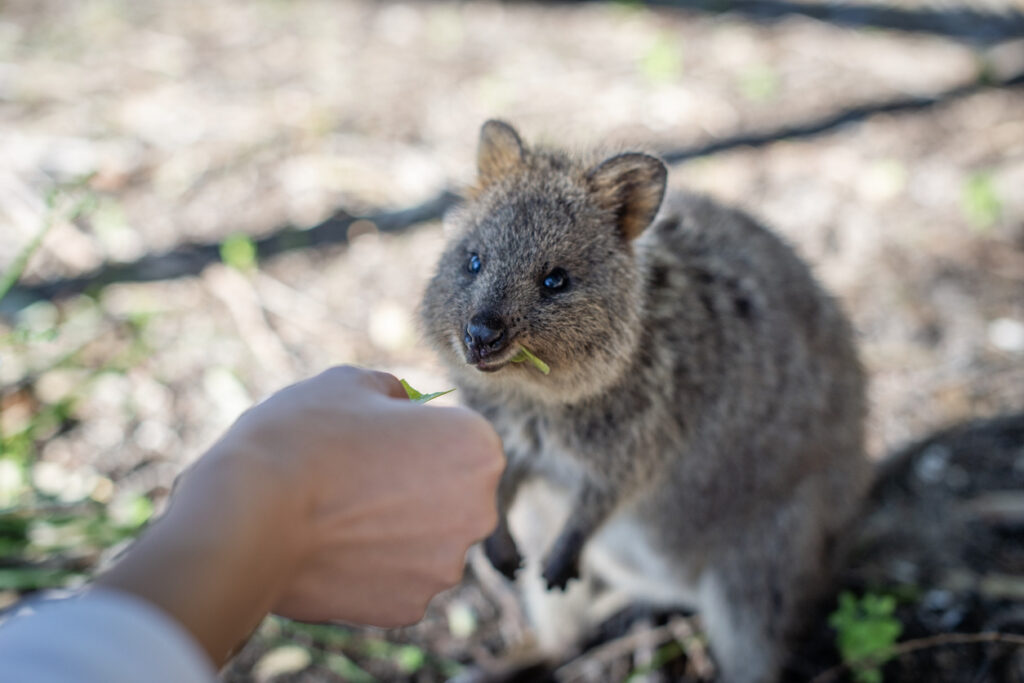
With their round cheeks, twitchy noses, and permanent-looking smiles, quokkas have been dubbed “the world’s happiest animal”—but their charm goes far beyond looks. Native to Rottnest Island in Western Australia, quokkas are marsupials about the size of a housecat, and they have zero fear of humans. They’re so approachable that tourists routinely report quokkas walking right up to them, sniffing their hands, and even “posing” for selfies. It’s not trained behavior—it’s instinctive friendliness born from thousands of years without natural predators.
According to Murdoch University researchers, this unusual social behavior isn’t just cute—it has psychological benefits. Interacting with quokkas can boost mood and reduce stress, and their calm demeanor makes them ideal ambassadors for wildlife tourism. Unlike many wild animals, quokkas rely on group nesting and frequent physical closeness for survival, which may explain their openness to bonding with humans. Though you’re not allowed to touch or feed them, a chance encounter with one of these fuzzy, trusting little creatures feels like being chosen. And let’s be honest—if one walked into your lap, would you ever move again?
7. Horses
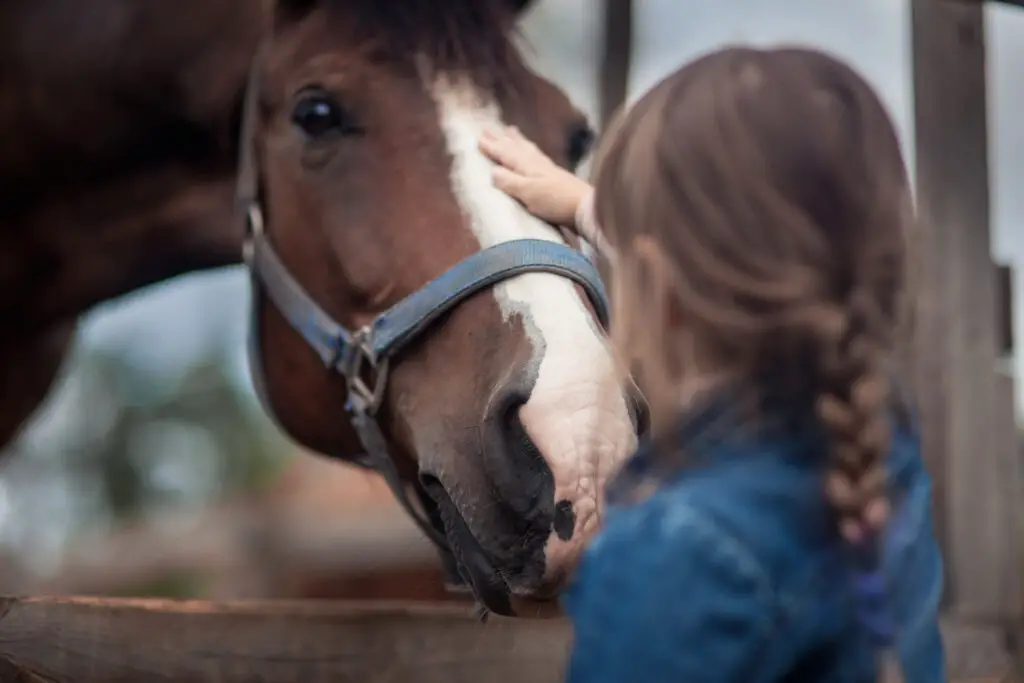
Horses may be powerful and stoic, but they’re also remarkably sensitive and emotionally intelligent. Long before neuroscience backed it up, equestrians knew their horses could “feel” them—reading emotions, responding to energy shifts, and offering silent support without a word. Horses are herd animals, hardwired to notice subtle changes in behavior, which makes them uniquely responsive to human cues. Many form lifelong bonds with their caretakers and become visibly distressed when separated. Some even nuzzle their owners’ faces and stand protectively near them during stress or grief.
According to a University of Sussex study, horses can recognize human facial expressions and remember emotional experiences, responding more cautiously to people who previously looked angry and more openly to those who smiled. Their ability to interpret tone, body language, and even heart rate has made them key players in equine-assisted therapy for PTSD, anxiety, and autism. When humans groom or ride horses, both species show a decrease in cortisol levels and an increase in oxytocin, the chemical of trust and bonding. So while a horse may not wag its tail or lick your face, its quiet companionship might be one of the deepest friendships you’ll ever feel.
8. Pigs

Pigs aren’t just smart—they’re emotionally complex, socially savvy, and surprisingly affectionate. These curly-tailed geniuses have been shown to learn names, solve puzzles, and recognize themselves in mirrors—something only a handful of species on Earth can do. In sanctuaries and research settings, pigs frequently bond with their human caretakers, following them around, nuzzling for attention, and even flopping over for belly rubs. Many caregivers say pigs act more like dogs than livestock, eager for play, interaction, and companionship.
A study published in the journal Animal Cognition found that pigs can not only recognize individual humans but also react differently based on prior treatment, showing clear emotional preferences. Other studies have documented pigs experiencing empathy, frustration, and joy, and even adjusting their behavior to comfort distressed companions. Their sensitivity makes them ideal candidates for emotional support and therapy settings, particularly when rescued from abuse. So the next time you see a pig rolling happily in the mud, don’t underestimate what’s going on behind those bright, intelligent eyes. They just might be looking for a lifelong friend—preferably one with snacks.
9. Cats

Cats may have a reputation for independence, but science says they’re far more bonded to their humans than most people think. While their affection may be subtler than a dog’s, it’s no less real. From slow blinks and gentle headbutts to following you from room to room, cats use their love language to show trust. Some sleep curled against your chest, while others chirp softly just to announce they’re nearby. And despite the stereotype, many cats form deep attachments and experience separation anxiety when their favorite person is gone.
Studies have shown that cats can recognize their owner’s voice and even form secure attachment styles similar to those of infants and dogs. When given a choice between food, toys, or their human, most cats will choose the human, especially if that human has been consistently kind. Cats have also been observed adjusting their behavior to match their owner’s emotional state, purring more when you’re sad or anxious, and staying closer during periods of stress. Earning a cat’s friendship may take time and patience, but once you do, it’s fiercely loyal and quietly constant.
10. Cows
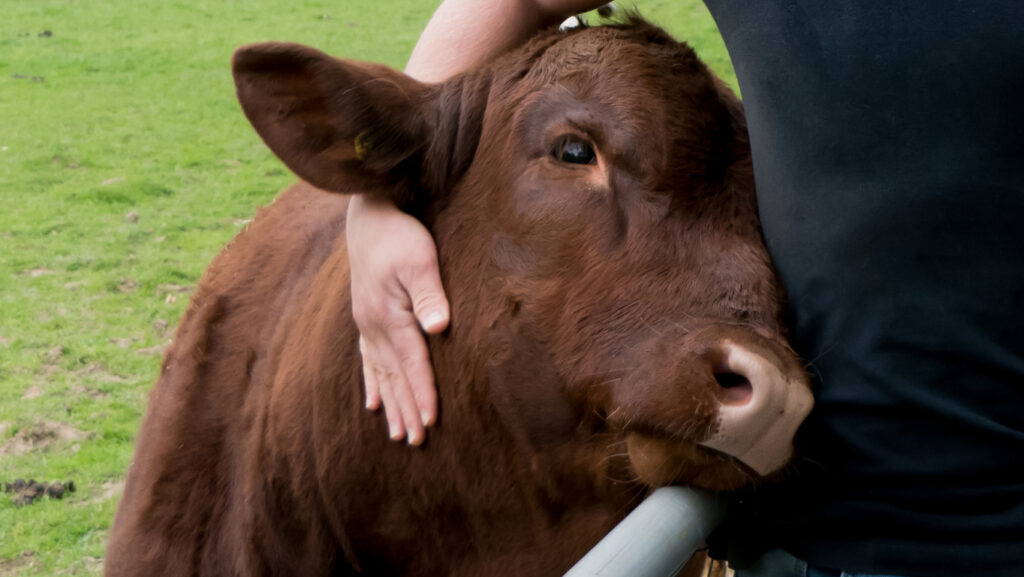
Cows may not be the flashiest animals on the farm, but they’re quietly among the most gentle and emotionally complex. These big-eyed grazers form strong bonds within their herds and with the humans who care for them. They’ve been observed licking, nuzzling, and even resting their heads on the shoulders of people they trust. At sanctuaries, some cows follow their caretakers around like dogs, letting out soft, happy moos when approached. They recognize familiar voices, enjoy physical affection, and show signs of contentment through relaxed body language and calm vocalizations.
What makes cows especially remarkable is their capacity for emotional depth. They form close friendships—sometimes refusing to eat when separated—and can remember individual humans for years. Research has shown that cows experience a wide range of feelings, including joy, fear, jealousy, and grief. They even exhibit signs of excitement when learning something new or reuniting with a beloved friend. Some farmers have noticed that cows produce more milk when treated gently and spoken to by name, suggesting that kindness directly impacts their well-being. If you’ve never been licked on the face by a 1,200-pound lovebug, you might not realize just how much friendship a cow has to give.
11. Parrots
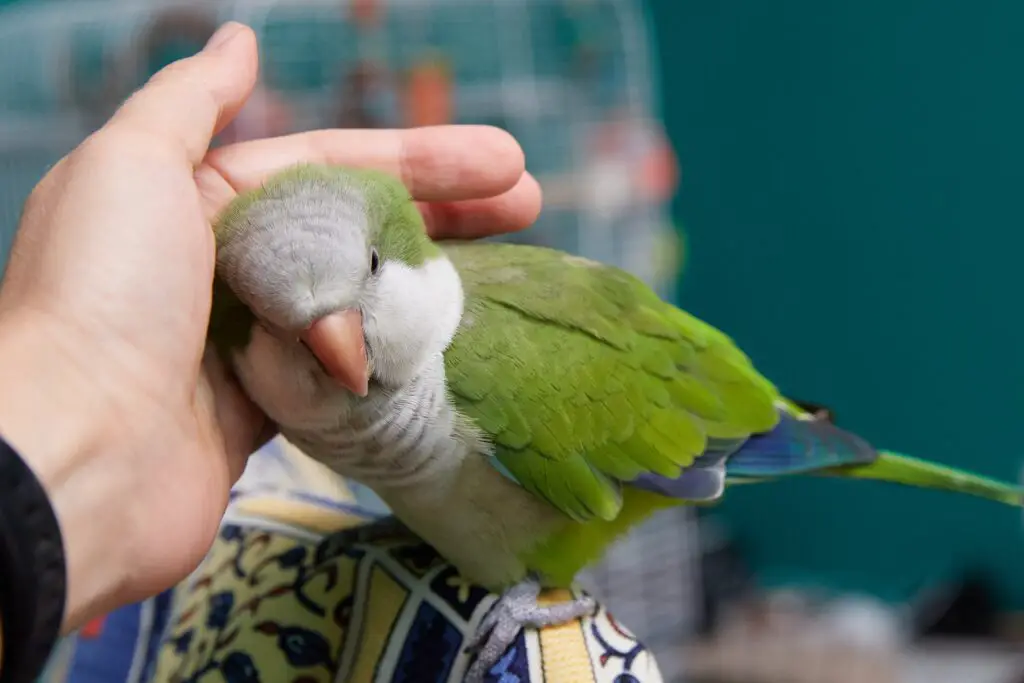
Parrots aren’t just talkers—they’re thinkers, feelers, and fiercely loyal companions when they bond with someone. With cognitive abilities comparable to a young child, many parrot species like African greys, macaws, and cockatoos can understand concepts, form emotional attachments, and even invent new words to communicate with their humans. Once they choose you, parrots tend to latch on hard, following you room to room, calling your name, and chattering at you like a lifelong friend. They’ve been known to imitate not just speech, but laughter, sneezes, and even emotional tones they hear regularly.
What makes parrots so unique is the intensity of their loyalty. They form strong pair bonds in the wild, and that instinct often transfers directly to a favorite human in captivity. Parrots have been observed bringing toys as gifts, mimicking affectionate sounds, and becoming visibly distressed when separated from their person. Behavioral studies show they can experience complex emotions like jealousy, boredom, and grief. Without enough attention, parrots may even self-isolate or pluck their own feathers from stress. But when treated with respect and love, they return it tenfold, with lifelong devotion and a never-ending soundtrack of affection.
12. Sea Lions
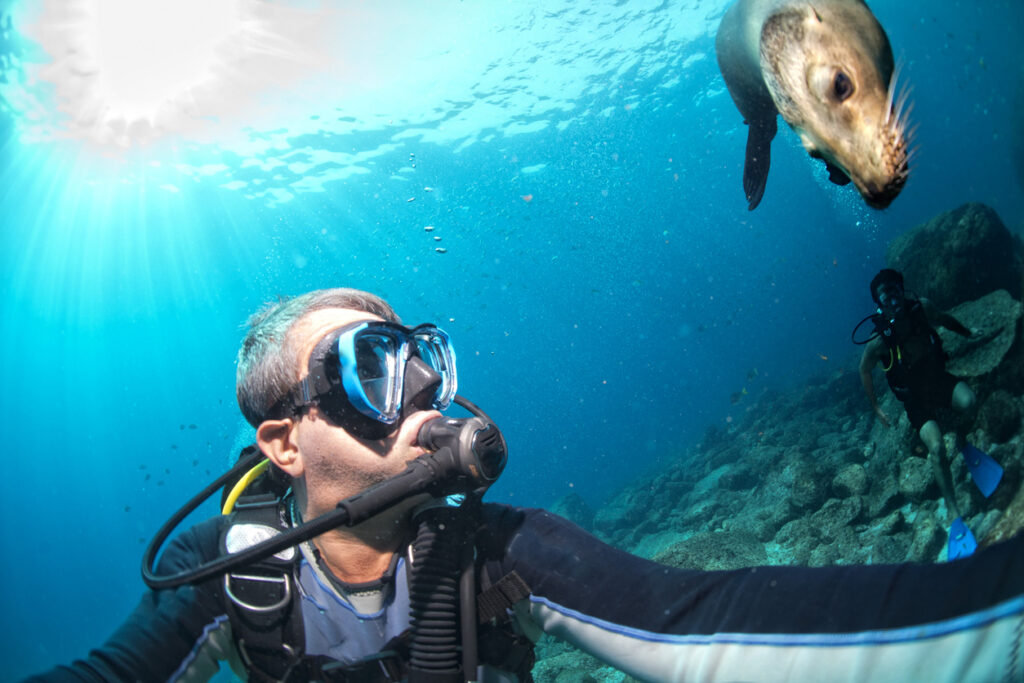
Sea lions might look like slippery goofballs, but don’t let the flippers fool you—they’re social, expressive, and surprisingly into people. Along coastlines from California to New Zealand, wild sea lions have been seen swimming alongside snorkelers, spinning through the water like underwater acrobats, and even nudging humans gently, as if inviting them to play. Juvenile sea lions, especially, are known to mimic diver movements, blow bubbles in your direction, or hover nearby with wide, curious eyes. They’re like golden retrievers of the sea—only sleeker, wetter, and better at holding their breath.
What makes sea lions so open to friendship? For one, they’re incredibly social animals. They live in massive colonies where communication, play, and body contact are part of daily life. Researchers have documented their ability to recognize individual voices and respond to trained signals, and some sea lions have been taught to complete complex tasks in both research and conservation programs. But even outside of training, their friendliness seems genuine. In the wild, sea lions have approached humans without food as a motivator, often circling them playfully or maintaining eye contact. It’s hard not to feel chosen when a sleek, whiskered face rises from the deep just to say hello.
The Wild Just Wants to Say Hi
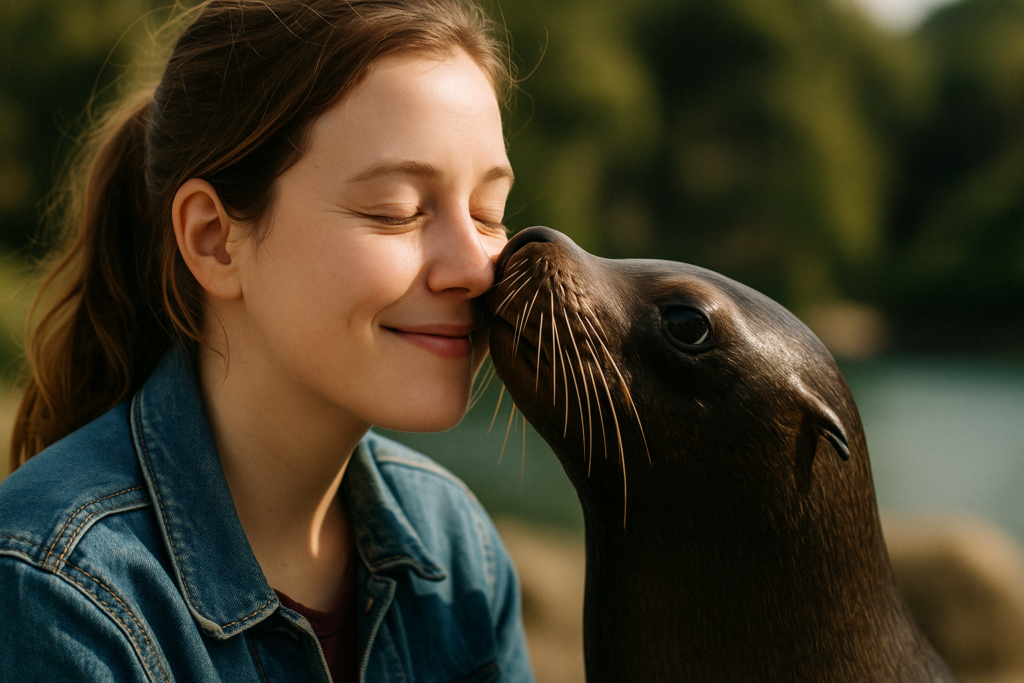
Not every animal runs at the sight of humans. Some walk right up. They nudge us, mimic us, follow us, and sometimes, they flat-out adore us. From sea lions that invite us to play to pigs who remember our names, these twelve creatures don’t just tolerate human presence—they seem to crave connection. Their gestures might be subtle or silly or downright surprising, but they all point to the same truth: friendship doesn’t need words. Sometimes, it just needs trust.
In a world that often feels disconnected, these animals remind us of something deeply grounding—that kindness echoes beyond our species. When a cow leans in for a scratch or a raven drops off a shiny trinket, it’s not just cute—it’s real. These cross-species bonds are honest, emotional, and in many cases, backed by biology. So, whether it’s a dolphin circling your kayak or a cat slow-blinking from the windowsill, take the moment. Friendship, it turns out, is everywhere—and the wild is absolutely in on it.


